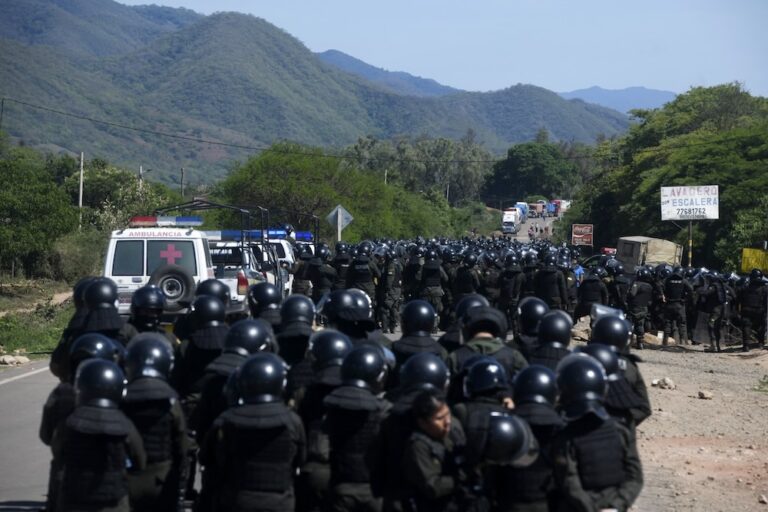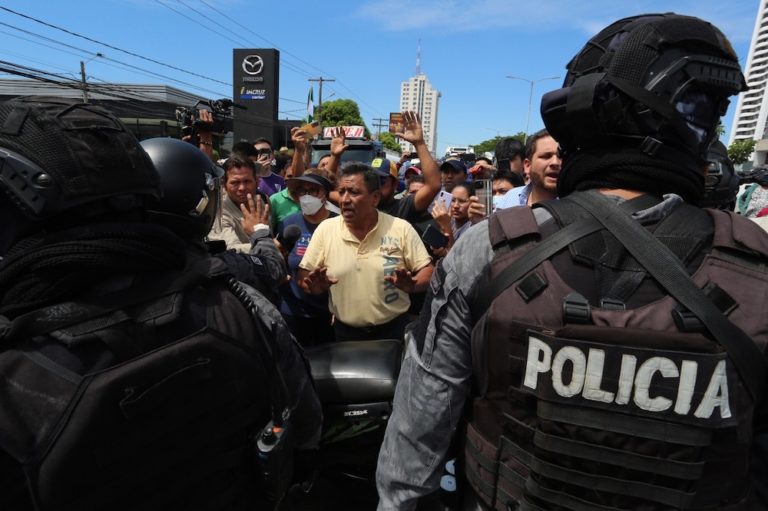(IPYS/IFEX) – As a result of Bolivia’s ongoing political crisis, the nation’s media outlets have been subjected to a series of violations of both their freedom of expression and their right to information. On 12 September 2008, Claudia Méndez, a journalist for the privately-owned PAT television network, was hit in the right ankle by a […]
(IPYS/IFEX) – As a result of Bolivia’s ongoing political crisis, the nation’s media outlets have been subjected to a series of violations of both their freedom of expression and their right to information.
On 12 September 2008, Claudia Méndez, a journalist for the privately-owned PAT television network, was hit in the right ankle by a stray bullet. The incident took place when at least ten journalists were covering a military operation aimed at regaining control of the airport in Cobija, Pando department. Pando is at the centre of the violent confrontations taking place in northern Bolivia.
At the time of the incident, journalists and camera operators from a number of media outlets had entered the airport in order to film the military operation. Soldiers fired into the air in order to get civilians and journalists to withdraw from the area after a military aircraft that was landing had apparently come under attack by individuals with machine guns. A confrontation broke out and several people were wounded, according to journalist Juan Carlos Paredes of the FIDES group of radio stations.
PAT’s news director, Renán Estensoro, told the National Press Association (Asociación Nacional de la Prensa, ANP) that Méndez was hit by a stray bullet. Méndez’s camera operator managed to help her leave the area while she bled from the gunshot wound. One soldier and a civilian died in the confrontation, and another four people were wounded.
According to reports by several national media outlets, the military operation to regain control of the airport, which took place an hour before the government declared Pando to be in a “state of siege”, turned violent because the soldiers fired on groups of civilians who were outside the terminal trying to resist the military incursion with guns, rifles and even automatic weapons.
On the same day, Canal 45 television station, an affiliate of the privately-owned Cadena A network, suspended its broadcasting, noting that the conditions required to continue operating were not in place.
In a separate incident, on 13 September, seven journalists working for privately-owned media outlets, who had arrived in Cobija from La Paz, were forced by army personnel to return to La Paz. According to the ANP, journalists from the state-owned television station Canal 7 Televisión Boliviana and the Bolivian Radiophonic Education (Educación Radiofónica de Bolivia, ERBOL) radio network were allowed to stay.
In a statement released by the ANP, the organisation characterised the incident as censorship of the independent press and condemned the army’s actions, noting that the independent media simply wanted to “investigate and inform on the bloody events taking place in Pando recently.”
The ANP pointed out that “this attack on freedom of the press and freedom of expression” also represents an infringement of the country’s Constitution, which guarantees those rights. In its statement the ANP warned that this type of censorship is the first that has taken place in the country since the reestablishment of democracy and that it was carried out by an institution that is responsible for protection of the guarantees laid out in the Constitution.
A reporter for the daily “La Razón” newspaper, who was forced to return to La Paz along with reporters from the ATB and PAT television networks and a member of the foreign press, said that President Evo Morales invited the press to cover the events in Cobija, and that they travelled there in a Bolivian Air Force plane together with a contingent of soldiers.
On arrival at Cobija they were not allowed outside the airport, but rather were taken to another plane and removed from the airport by a commanding officer, following orders from the Ministry of Defence. They were told that the area had been declared to be in “red alert” and that their safety in Pando could not be guaranteed. However, reporters working for the state-owned television station and national radio station were allowed to stay.
In a third incident, on 13 September photographer Ángel Farell and journalist Christian Peña y Lillo, of “El Deber” newspaper, were assaulted by a group of farmers who support President Evo Morales’s government. The event took place in the area of Tiquipaya, in Santa Cruz, eastern Bolivia.
Farell is being kept under observation in hospital. Peña y Lillo suffered minor contusions.
The incident took place while the journalists were covering a confrontation between a pro-autonomy group that opposes the government and farmers who support the governing Movement towards Socialism (Movimiento al Socialismo, MAS) party. The government opponents were attempting to open a road that had been blocked by the pro-government group as part of the violent political actions taking place in the country in the last twenty days.
Farell told the ANP that the farmers overtook the pro-autonomy group and attacked several journalists. The photographer reported that he was knocked down and beaten with sticks by the farmers, who also took his camera from him. He said that the assault left him semi-conscious and that his assailants assumed he was dead. The journalist was able to escape into a wooded area until he was finally given assistance. Farell suffered a wound to the head that required fifteen stitches. He also has bruises all over the body and doctors are evaluating his condition to determine if there may be any further complications.
The ANP was unable to obtain the farmers’ version of the events as the route into the area is blocked and the local media are unable to enter the region due to a lack of protection.
Updates alerts on attacks on journalists and media outlets during political crisis:
http://ifex.org/en/content/view/full/97040


